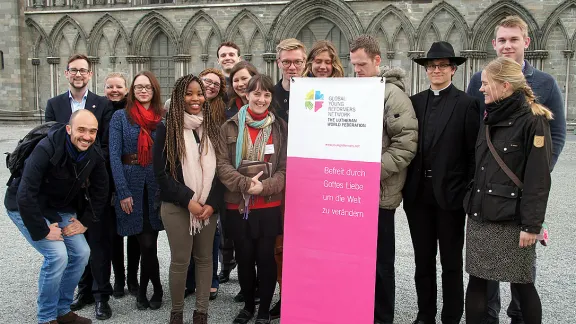
Europeâs Young Reformers at their first meeting in Trondheim, Norway. Photo: LWF/C. Richter
LWF European ‘Young Reformers’ explore questions of Lutheran identity
(LWI) – Participants in the first meeting of young reformers from the Lutheran World Federation (LWF) member churches in Europe have begun exploring ways they can strengthen and shape Lutheran identity globally.
“The church changes with the people. The people who are part of the church are the reformation,” said Triin Salmu, Estonian Evangelical Lutheran Church, at the regional Global Young Reformers Network (GYRN) meeting in Trondheim, Norway.
Salmu and 14 other network members are preparing their contribution to an "intergenerational dialogue" on how LWF member churches can address the injustices brought about by climate change. The panel, in the context of the 11-14 May European Church Leadership Consultation, will focus on “Creation: not for sale,” a sub-theme of the 500th Reformation anniversary and the LWF’s Twelfth Assembly theme, “Liberated by God’s Grace.”
For the 27-year-old Salmu, the network provides an opportunity for people to come together and reform together. “The network can implement change on a global level that one church can’t do alone,” she added.
The LWF Department for Mission and Development and its youth desk established the network in 2013. Inspired by the Reformation anniversary theme, the network coined the phrase, “Freed by God’s love to change the world,” to encourage young people (18-30 years) to contribute to the 2017 Reformation anniversary and LWF assembly.
At the 13 May panel session, the network members were to engage the European church leaders in intergenerational conversations about theological insights on climate justice, and about action that churches could take to initiate or strengthen policies to become carbon neutral by 2050. They also wanted to learn about practical measures that could be adopted including re-learning good practices from the older generations.
Always seeking to be reformed
The understanding of ecclesia semper reformanda (a church always seeking to be reformed) generated a variety of responses in the preparatory meeting. “I understand the ongoing reformation in the churches as a vibrant and living development. The spirit of reform lives on in the generations that see things differently from the past generation. This is how all new generations and the previous ones have explored and changed their churches,” noted 25-year-old Andreas Alexander Fosby, Church of Norway.
Fosby expressed appreciation for the network, saying it “crosses the borders between the different churches and makes the idea of a communion of churches possible.” Young people today already live in a world with fewer borders and more openness, and are in contact with people from all over the world. “With that aspect, we can change and relate to each other at so many levels,” he added.
Game changer
For Tim Sonnemeyer, 22, of the Evangelical Lutheran Church in Bavaria, Germany, ecclesia semper reformanda involves ongoing rethinking about Lutheran identity, with a perspective on diverse global contexts. “Each generation is challenged by different cultural, political, social, and as Christians, theological, questions. Being Lutheran is different today than it was 500, 100 or even 50 years ago. However, we are all united in Christ, no matter which year we live in or what continent we live on,” he said.
The network changes the game of rethinking Lutheran identity, said Sonnemeyer. “By using modern communication methods we have the possibility to get to know young Christians and their background easily. We engage in a dialogue that reaches out to what is probably the largest group of young Lutheran adults ever addressed. That is impressive and means we can shape the Lutheran identity of tomorrow.”
At the meeting in Trondheim, the young reformers also “discussed new ideas for discipleship and mission in shrinking churches, the place of the church in a secular society, political engagement as Lutherans and other perspectives that shape our Lutheran identity today,” LWF youth secretary Caroline Richter explained.
Richter organizes the regional meetings of the network in Africa, Asia, Europe, Latin America and the Caribbean and North America. The series of training workshops will culminate in a global GYRN workshop, 22 August - 4 September 2015, in Wittenberg, Germany.
For more on the LWF youth program see our page.


